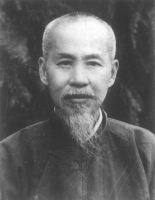| Last Name: | 熊 | ||
| First Name: | 继智 | ||
| Name and Alias: | 子真 | ||
| Web/Pen/Nick Name: | 逸翁; 漆园老人; 升恒; 定中 | ||
| Township: | 湖北黄冈县上巴河张家湾 | ||
Read works of Xiong Shili at 百家争鸣 | |||
Xiong Shili (Chinese: 熊十力; pinyin: Xióng Shílì; Wade–Giles: Hsiung Shih-li, 1885 – May 23, 1968) was a Chinese essayist and philosopher whose major work A New Treatise on Vijñaptimātra (新唯識論, Xin Weishi Lun) is a Confucian critique of the Buddhist Vijñapti-mātra "consciousness-only" theory popularized in China by the Tang-dynasty pilgrim Xuanzang.
Xiong is widely regarded as the thinker who laid down the basis for the revival of Confucianism during the twentieth century, and the main voice in contemporary Chinese philosophy who called for a revival of the Confucian dao. He felt it could provide a guide for the country during its tumultuous period following the May Fourth Movement in 1919.:127 He felt that national survival was predicated on a sense of community, which in turn could only come from trusting commitments from the people involved. He believed that the most urgent task for the educated elite in China was to raise the cultural awareness and sensitivity of the people that the clash between the West and China was not solely a clash of economic strength and military might, but also a conflict between basic human values.:248 While he led a fairly secluded life throughout his career as a teacher and his association with the academic community did not begin until he was in his late thirties, his views have influenced scholars to this day.
